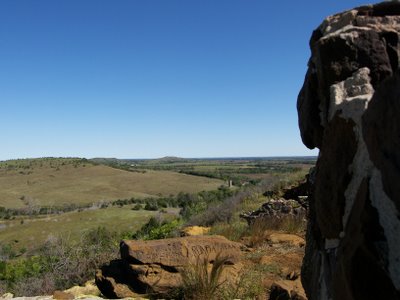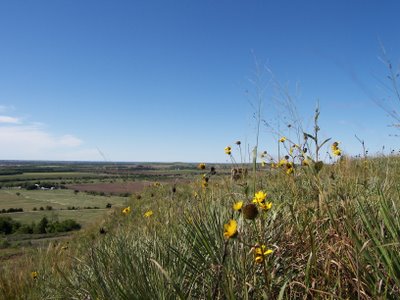
Wednesday, September 27, 2006
Tuesday, September 26, 2006
Do Women Read More Fiction Than Men?
The Chronicle of Higher Ed, quoting from an article that appeared in In These Times, recently reported that women read fiction far more than men. More information regarding the results of surveys conducted in the UK, Canada, and the US can be found at the following link: In These Times .
As I mentioned in a previous post, I haven't been reading much fiction within the last few years. Currently, however, I am reading a new collection of stories by Thomas Fox Averill, a Kansas resident and a writer known to some of us in Kansas and the Great Plains. Entitled Ordinary Genius, this collection contains those stories written since Seeing Mona Naked (his last collection of stories), roughly a period of about fifteen years. I have been known to introduce my students to Averill's work, particularly "The Last Dancing Pig in Southeast Kansas," a story my students find funny and significant because Jacob's relationship with the pig parallel the male-female relationships in the story. I highly recommend this particular story and any one of Averill's collection of stories; his first one, and the one containing "The Last Dancing Pig in Southeast Kansas," is entitled Passes at the Moon.
As I mentioned in a previous post, I haven't been reading much fiction within the last few years. Currently, however, I am reading a new collection of stories by Thomas Fox Averill, a Kansas resident and a writer known to some of us in Kansas and the Great Plains. Entitled Ordinary Genius, this collection contains those stories written since Seeing Mona Naked (his last collection of stories), roughly a period of about fifteen years. I have been known to introduce my students to Averill's work, particularly "The Last Dancing Pig in Southeast Kansas," a story my students find funny and significant because Jacob's relationship with the pig parallel the male-female relationships in the story. I highly recommend this particular story and any one of Averill's collection of stories; his first one, and the one containing "The Last Dancing Pig in Southeast Kansas," is entitled Passes at the Moon.
Sunday, September 24, 2006
Wednesday, September 20, 2006
Another Example of Scenic Kansas
I have added another picture. Clicking on it will enlarge it. If you decide to save any of these photos, from this post and the previous one, onto your computer to use as either wallpaper or as part of a screensaver, I would at least like for you to leave me a comment.


Sunday, September 17, 2006
Scenic Kansas
Over the weekend, I managed to get away from my grading. Pictures of the view from Coronado Heights appear in these two photographs. Marking the furthest north that Coronado had come in his search for gold, Coronado Heights is located in the Smoky Hills, which are a bit south of Salina in mid-central Kansas.
Clicking on these picures will enlarge them.

Clicking on these picures will enlarge them.


Thursday, September 07, 2006
Anthony Sobin and "The Dream of the Moth"
One poet I’m especially fond of is Anthony Sobin, sometimes known as A.G. Sobin or Anthony G. Sobin. His only collection The Sunday Naturalist appeared in 1982. Fortunately, the Beloit Poetry Journal has digitized its archives, making some of Sobin’s poems available to those unfamiliar with his full-length collection. The Dream of the Moth, for example, reveals playful use of metaphor and vivid imagery.
My reluctance to accept his criticism prevented us from working well together when I was a student of his around the same time that his book came out. That division kept me from applying to the MFA program at Wichita State where I would have created a book under his tutelage. I had a weird conception of my own poems, thinking that they should emphasize sound over sense. Nonetheless, in hindsight, I was lucky to make his acquaintance and could have learned more if I had been less arrogant and less stubborn.
Conflict and Escape
Amazingly, even though I don’t see my students face-to-face and don’t deal with the personality issues that evolve within an onground classroom, I encounter conflict within my online classes—either because the students cannot hold a civil discussion among themselves or because they cannot recognize and respect differences in values and beliefs. Three weeks into the semester, I am already encountering problems among the students in one of my classes.
It seems as though these kinds of conflicts have been more common since Bush, Jr., has taken office and since the collapse of the Twin Towers. The connection could just be a coincidence or post hoc ergo proctor hoc. Even so, the amount of fear created among the populous by the Bush administration seems to have created a climate in which conflict occurs more often because of the inability to respect each other. This absence of mutual respect occurs on an individual basis and among cultures. One of the news magazines once featured on its cover a woman’s face onto which the various facial characteristics of the ethnic cultures that make up this country had been blended together. That sense of cohesion, that commingling of cultures, occurs less often now.
Personally, I have sought to get farther away from people. That’s why my profile makes mention of my desire to live somewhere between the 98th and the 105th meridian. I recognize, of course, that the odds of finding people like myself, that is, with the same interests and beliefs, would occur infrequently out there. When younger, a large part of my life was spent in disguise. At that time, generational differences and the attendant attitudes toward things like the Vietnam war and marijuana were largely determined by the length of one’s hair. Having had alopecia universalis when I was a preschooler and in elementary school, what hair I had when it started to grow again—on my head, at least—was never very thick. Once, after walking into a hippie bar, I was labeled a narcotics agent, aka narc, and threatened with a knife in my side if I didn’t leave. Unbeknown to that guy who whispered in my ear, I had already altered my consciousness when I walked into the bar, and I certainly wasn’t going to turn anyone in. It was hard enough seeing anything six feet in front of me. Living with my baldness has gotten easier as I have grown older. Even though my alopecia has returned in certain spots, mostly on my face, it doesn’t matter anymore what someone says or when someone stares. That kind of behavior has occurred often enough that I largely ignore it.
Working among lots of people in a Wichita hospital years ago completed my transformation into a misanthrope. It isn’t something that occurs monthly like a lycanthrope. Instead, it remains a constant to a degree, surfacing most strongly when I feel as though I have to get away from everyone except my wife and son, when I have been around too many people and need to escape to a quieter environment.
At this Wichita hospital, when I worked on Saturdays, I managed to escape during my lunch break to the top floor of one building, which was still unfinished, and gaze out onto the city, the number of trees preventing me from picking out particular landmarks. Now, I take walks in the early morning when there are few people about, except the occasional man or woman leading a dog, and feel a sense of satisfaction that I don’t live in a large city among the constant noise, the traffic, and the fewer chances to get away. These quiet times are rejuvenating, making it somewhat easier to interact with humans again.
It seems as though these kinds of conflicts have been more common since Bush, Jr., has taken office and since the collapse of the Twin Towers. The connection could just be a coincidence or post hoc ergo proctor hoc. Even so, the amount of fear created among the populous by the Bush administration seems to have created a climate in which conflict occurs more often because of the inability to respect each other. This absence of mutual respect occurs on an individual basis and among cultures. One of the news magazines once featured on its cover a woman’s face onto which the various facial characteristics of the ethnic cultures that make up this country had been blended together. That sense of cohesion, that commingling of cultures, occurs less often now.
Personally, I have sought to get farther away from people. That’s why my profile makes mention of my desire to live somewhere between the 98th and the 105th meridian. I recognize, of course, that the odds of finding people like myself, that is, with the same interests and beliefs, would occur infrequently out there. When younger, a large part of my life was spent in disguise. At that time, generational differences and the attendant attitudes toward things like the Vietnam war and marijuana were largely determined by the length of one’s hair. Having had alopecia universalis when I was a preschooler and in elementary school, what hair I had when it started to grow again—on my head, at least—was never very thick. Once, after walking into a hippie bar, I was labeled a narcotics agent, aka narc, and threatened with a knife in my side if I didn’t leave. Unbeknown to that guy who whispered in my ear, I had already altered my consciousness when I walked into the bar, and I certainly wasn’t going to turn anyone in. It was hard enough seeing anything six feet in front of me. Living with my baldness has gotten easier as I have grown older. Even though my alopecia has returned in certain spots, mostly on my face, it doesn’t matter anymore what someone says or when someone stares. That kind of behavior has occurred often enough that I largely ignore it.
Working among lots of people in a Wichita hospital years ago completed my transformation into a misanthrope. It isn’t something that occurs monthly like a lycanthrope. Instead, it remains a constant to a degree, surfacing most strongly when I feel as though I have to get away from everyone except my wife and son, when I have been around too many people and need to escape to a quieter environment.
At this Wichita hospital, when I worked on Saturdays, I managed to escape during my lunch break to the top floor of one building, which was still unfinished, and gaze out onto the city, the number of trees preventing me from picking out particular landmarks. Now, I take walks in the early morning when there are few people about, except the occasional man or woman leading a dog, and feel a sense of satisfaction that I don’t live in a large city among the constant noise, the traffic, and the fewer chances to get away. These quiet times are rejuvenating, making it somewhat easier to interact with humans again.
Subscribe to:
Comments (Atom)







